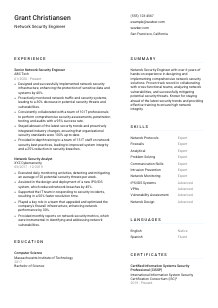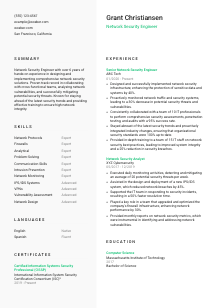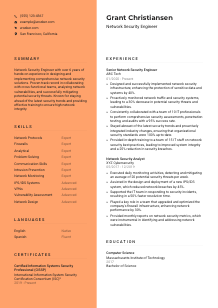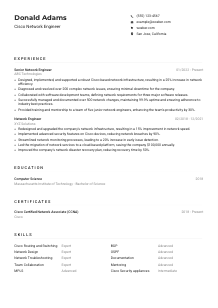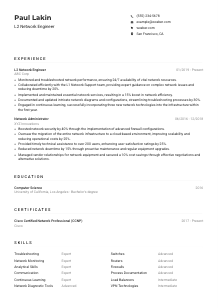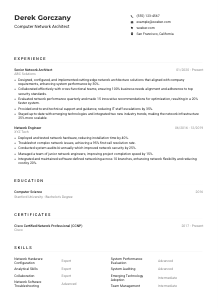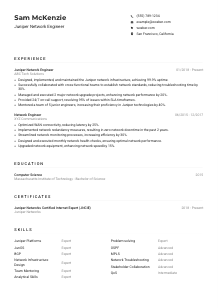Network Security Engineer CV Example
Fending off virtual threats, but your CV feels exposed? Dive into this Network Security Engineer CV example, armored with Wozber free CV builder. See how you can align your cybersecurity know-how with job requisites, cementing your career as a guardian of secure networks!
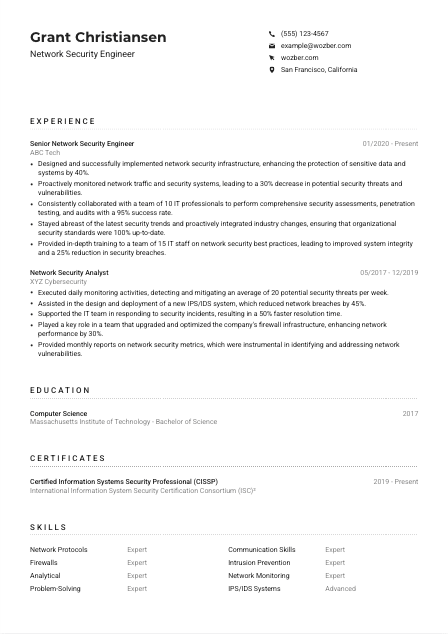
How to write a Network Security Engineer CV?
Congratulations, aspiring Network Security Engineer! In the cyber-fortified battleground of career progression, your CV is your trusty shield and sword. But worry not, as this guide, armed with Wozber's free CV builder, is your loyal squire in this quest.
Together, we'll tailor your CV to resonate with the heart and soul of your desired role, making it not just ATS-compliant but also a testament to your unique prowess in network security. Let's embark on this journey to ensure your career fortress is impregnable!
Personal Details
Your Personal Details section is more than just a header; it's the digital handshake that introduces you to your future employers. Let's meticulously craft this section to make a stellar first impression, ensuring it perfectly aligns with the Network Security Engineer role you're eyeing.
1. Your Name is Your Banner
Imagine your name flying high on a banner above a castle; it should be bold and commanding attention. Use a clean, clear font and size it slightly larger than the rest of the CV. This isn't just typography; it's your first claim to the throne.
2. Title Precision
Just below your name, your desired role, 'Network Security Engineer,' should be clearly stated. This isn't a time for ambiguity; align your title with the job description to let the hiring manager know you're a perfect fit right from the start.
3. Contact Information: Your Messenger Pigeons
Provide your most reliable contact number and a professional email address (firstname.lastname@email.com format preferred). This ensures the hiring manager can send their raven your way without any misdirections.
4. Signal Your Location
The role demands your presence in 'San Francisco, California.' Hence, make sure this is clearly indicated in your contact details. It optimistically tells your potential employer that you're ready and available, sans the burdens of relocation.
5. A Dash of Professional Flamboyance
If applicable, including a well-maintained LinkedIn profile or a personal website showcasing your professional portfolio can add a dash of flamboyance. Ensure they echo the professionalism and skill set found in your CV.
Takeaway
These elements of the Personal Details section are your banners in the digital field. They announce your presence, your readiness, and your alignment with the Network Security Engineer role. Crafted carefully, they set the stage for the tale of valor that follows in your CV. Keep it concise, relevant, and let each detail champion your cause.





Experience
The Experience section is where your tales of valor come to life. Here, you articulate your journey through the realms of network security, showcasing how each quest has prepared you for the role at hand. Let's delve into crafting an Experience section that mirrors the job description, proving you are the hero they seek.
- Designed and successfully implemented network security infrastructure, enhancing the protection of sensitive data and systems by 40%.
- Proactively monitored network traffic and security systems, leading to a 30% decrease in potential security threats and vulnerabilities.
- Consistently collaborated with a team of 10 IT professionals to perform comprehensive security assessments, penetration testing, and audits with a 95% success rate.
- Stayed abreast of the latest security trends and proactively integrated industry changes, ensuring that organisational security standards were 100% up‑to‑date.
- Provided in‑depth training to a team of 15 IT staff on network security best practices, leading to improved system integrity and a 25% reduction in security breaches.
- Executed daily monitoring activities, detecting and mitigating an average of 20 potential security threats per week.
- Assisted in the design and deployment of a new IPS/IDS system, which reduced network breaches by 45%.
- Supported the IT team in responding to security incidents, resulting in a 50% faster resolution time.
- Played a key role in a team that upgraded and optimised the company's firewall infrastructure, enhancing network performance by 30%.
- Provided monthly reports on network security metrics, which were instrumental in identifying and addressing network vulnerabilities.
1. Analyze the Realm's Needs
Embark by dissecting every requirement and preference from the job description. It's your map to understand the battlefield. For example, 'monitor network traffic and respond to threats' directly informs how you should write about your past roles.
2. Tabulate Your Quests
List your roles chronologically, with your most recent at the forefront. Each role should clearly state your title, the name of your fellowship (company), and the duration of your quest. This structure lays out your journey and growth to the hiring manager, a clear path of your escalation in the ranks.
3. Chronicles of Achievement
Narrate your victories and how you achieved them, directly correlating with the job description. Phrases like 'Designed and successfully implemented network security infrastructure, enhancing protection by 40%' make your contributions tangible to the reader.
4. The Power of Numbers
Numerical achievements can turn the tide of battle in your favor. They provide concrete evidence of your impact, such as 'a 30% decrease in potential security threats.' Quantify your impact wherever possible to make your achievements more relatable and impressive.
5. Relevance Over Abundance
Avoid the temptation to include every single detail of your career. Focus on the experiences that align closely with the specific duties and requirements of the Network Security Engineer role. Each bullet point is a spear; wield them wisely, aiming only for what matters most in this quest.
Takeaway
With every position you've held, you unveil a part of your saga. Tailor your narrative to not only fulfill the requirements but also to display your distinctive worth. Let each achievement underscore your suitability and eagerness for the role. Your experience section is not just a record; it's proof of your readiness to protect and serve in the realm of network security.
Education
In the world of Network Security Engineering, your educational background is the forge where your basic abilities were honed. While it may seem straightforward, a strategic presentation of your education can significantly enhance your appeal to potential employers. Let's construct an Education section that aligns with the fortress you aim to defend.
1. Identify the Keystone
Begin by pinpointing the educational requirement listed in the job description. 'Bachelor's degree in Computer Science, Information Technology, or a related field' is not just a phrase; it's a key stone in the foundation of your career fortress. Make sure your degree matches.
2. The Blueprint of Your Education
Present your credentials in a straightforward manner: your degree, the field of study, the institution, and the year of graduation. This clarity acts as the blueprint of your educational foundation, providing a clear view of your scholarly journey.
3. Tailoring Your Academic Armor
If your degree precisely matches one requested in the job description (as 'Bachelor of Science in Computer Science' does), spotlight it proudly. This isn't just a match; it's the answer to a call, proving you have been moulded in the very educational tradition they seek.
4. Decorate With Pertinent Courses
Though for the Network Security Engineer role, the broad degree might suffice, don't miss the chance to highlight specific courses or projects that attest to your targeted skills and knowledge, especially if they align closely with the job's technical demands.
5. Distinction in the Details
If your academic journey includes honors, relevant extracurricular activities, or a particularly notable thesis, mention these accomplishments. They add layers to your educational persona, showcasing not just your intellect, but your passion and dedication.
Takeaway
The Education section is your standard, displaying the foundation upon which your career is built. Make it resonate with the essence of what employers seek, proving not just compliance but also depth and distinction in your academic journey. With each detail meticulously chosen, your CV becomes not just a document, but a proclamation of your readiness and relevance.
Certificates
In the realm of Network Security Engineering, certificates are not just accolades; they are tangible proofs of your ongoing quest for mastery and excellence. They speak of your dedication to staying at the frontline of cybersecurity advancements. Let's adorn your CV with these badges of honor, illuminating your expertise and readiness for the exploits ahead.
1. Sift Through the Annals
Revisit the job description and harvest the specific certifications demanded or recommended. They aren't just qualifications; they are keys to secret chambers. For instance, 'CISSP, CCNP Security, or GIAC' are not just acronyms but seals of prowess in the realm of network security.
2. Display Your Shields
Pick the certifications that directly resonate with the job's demands. It's akin to choosing the right shield for the upcoming battle; not all shields are made the same, and some are designed specifically to withstand certain onslaughts.
3. The Markings on Your Shields
Be transparent with the dates of your certifications. Just like a shield's markings tell of its age and stories, the dates on your certifications reveal their relevance and currency in the ever-evolving field of network security.
4. Forging New Badges
Network Security is a field that never sleeps, with new threats and challenges emerging with the dawn of each day. Regularly updating your cache of certifications and pursuing new ones is akin to sharpening your sword and reinforcing your armor. Stay ahead, stay relevant.
Takeaway
Certificates are your flags of expertise and commitment, signaling to potential employers your readiness and capability to stand guard over their digital fortresses. Let each certification you list be a testament to your dedication to growth, learning, and excellence in the field of Network Security Engineering. Your badges of honor are not just achievements; they're declarations of your unwavering commitment to cybersecurity.
Skills
Your skills section is a showcase of your professional arsenal, a carefully selected array of tools and strengths you bring to the battleground. For a Network Security Engineer, this means a blend of technical acumen and soft powers like analytical thinking and communication. Let's sculpt a Skills section that's both a mirror to the job requirements and a testament to your unique capabilities.
1. Decipher the Codex
Begin by interpreting the skills explicitly and implicitly mentioned in the job description. This is like cracking the codes of an ancient artifact; it reveals the essence of what's required in your field of battle.
2. Fabricate Your Arsenal
List the skills that are directly aligned with the job's demands, both hard skills like 'network protocols' and soft skills such as 'analytical' and 'problem-solving'. These are your weapons and armor, chosen for the specific foes you'll face in the role.
3. The Order of Your Armory
Prioritize and organize your skills, focusing on the ones most relevant to a Network Security Engineer. Consider this the strategy in revealing your arsenal; it should be neat, ordered, and with every tool serving a clear purpose.
Takeaway
Carefully selected and presented, your skills are the promise of value you bring to your future role. They are not mere words on a CV; they are your professional vows, each illustrating a facet of your readiness and distinction as a Network Security Engineer. Present them with pride, and always seek to sharpen and expand your arsenal.
Languages
In the interconnected realms of the digital world, the ability to communicate across borders is your bridge to countless forts and cultures. Especially for a Network Security Engineer, where understanding and communicating complex ideas is key, your linguistic prowess can be a significant asset. Let's unveil how to showcase your multilingual abilities, turning them into tools of engagement and understanding.
1. Decipher the Scrolls
First off, check if the job specifically highlights a language requirement, like the ability to 'read complex texts in English'. This isn't just a skill; it's a key to decoding the texts and lore of the realm you're seeking to protect.
2. Unfurl Your Banners
Prioritize the languages that are essential for the job, but also list others you know. Even if the job doesn't demand it, your linguistic diversity showcases your ability to navigate varied terrains and cultures - a valuable trait in the interconnected world of network security.
3. The Tapestry of Tongues
Be honest and clear about your proficiency levels. Just as a knight's banner reveals their allegiance and prowess, your language proficiency tells of your comfort and capacity in each language. Whether 'Native', 'Fluent', 'Intermediate', or 'Basic', each tells a part of your story.
4. Comprehend the Geography
Understanding the scope of the role helps in valuing your multilingual abilities. In roles with a global focus or liaison with teams across different geographies, your ability to communicate in multiple languages is not just a skill, it's a strategic advantage.
Takeaway
Your languages are more than just dialects; they are expressions of your ability to connect, understand, and influence. In a field as dynamic and global as Network Security, each language you speak is a testament to your versatility and readiness to engage in the multilingual tapestry of cybersecurity. Wear your linguistic capabilities as badges of honor, knowing they open doors to uncharted horizons and connections.
Summary
The Summary section is where you distill your essence into a powerful proclamation of your valor, skills, and readiness for the role of a Network Security Engineer. It's your rallying cry, succinctly capturing your professional saga and aspirations. Let's craft a Summary that's not just a brief of your CV, but a testament to your unique prowess and fit for the role.
1. Grasp the Essence
Begin by immersing yourself in the essence of the job requirements. Understand the battlefield, for it is key to aligning your summary with the precise needs and challenges of the role you're aspiring to.
2. Your Heraldic Introduction
Open with a statement that resonates with the profession of a Network Security Engineer, like 'with over 6 years of hands-on experience in designing and implementing comprehensive network security solutions.' This sets the stage, heralding your experience and specialization.
3. Showcase Your Banners
Highlight your key achievements and the skills that you bring to the table, directly addressing the job's requirements. Illustrate the unique impact you've made in your field, making your candidature not just suitable but compelling.
4. The Crest of Clarity
Keep your summary focused and impactful. Aim for 3-5 lines that articulate your professional identity and value proposition. This isn't just a brief; it's your crest, worn proudly at the helm of your CV, announcing your readiness to serve and excel.
Takeaway
Your summary is the standard you carry into the fray; it encapsulates your journey, skills, and aspirations. Tailoring it with precision makes your CV a beacon, guiding the hiring manager to recognize your distinctive value as a Network Security Engineer. With this forged, polished, and ready, step forth into the career battlefield with confidence. The realm of network security awaits your valor and expertise.
Embarking on Your Network Security Engineer Journey
Bravo, brave warrior! With these insights and Wozber's free CV builder at your side, wielding ATS-friendly CV templates and ATS optimisation tools like the ATS CV scanner, you are now fully equipped to craft an ATS-compliant CV that stands tall amid the fiercely competitive landscape of Network Security Engineering. Your CV is not just a document; it's your banner in the digital age, a reflection of your unique journey and capabilities. Go forth, refine your armor with Wozber, and let it be your ally in securing the role you're destined for.
The digital realm awaits its next guardian. Your journey begins now.

- Bachelor's degree in Computer Science, Information Technology, or a related field.
- Minimum of 5 years of experience in network security or related IT security positions.
- In-depth knowledge of network protocols, network devices, and security technologies including firewalls, IPS/IDS systems, and VPNs.
- Possession of or ability to obtain industry-recognized certifications such as CISSP, CCNP Security, or GIAC.
- Strong analytical, problem-solving, and communication skills, both written and verbal.
- Must have the ability to read complex texts in English.
- Must be located in San Francisco, California.
- Design, implement, and maintain the network security infrastructure to ensure the protection of the organization's sensitive data and systems.
- Monitor network traffic and security systems to detect and respond to potential threats and vulnerabilities.
- Collaborate with the IT team to conduct regular security assessments, penetration testing, and audits of the network infrastructure.
- Stay up-to-date with the latest security trends, vulnerabilities, and industry changes to ensure the organization's security standards remain current.
- Provide training and support to other IT staff regarding network security best practices and procedures.





